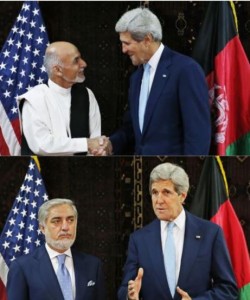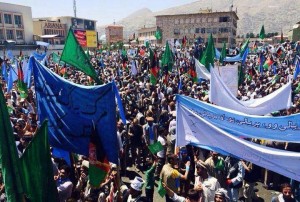Abdullah Becomes Serial Quitter While Dempsey Continues Denying Reality
The last 24 hours in Afghanistan are a perfect summation of the insanity imposed by endless US occupation.
On the election recount front, after warning for several days that he might do so, Abdullah Abdullah has withdrawn his observers from the audit process. The UN is desperate to see the process through to the end, as tweeted by ToloNews:
#UNAMA: The audit process is in its final stages. The process will move forward without the reps of either the camps. #Afghanistan
— TOLOnews (@TOLOnews) August 27, 2014
The Washington Post, in its article on Abdullah’s withdrawal, holds out hope that he will continue to take part in the negotiations on Kerry’s extra-constitutional shared governance plan:
It was not immediately clear Wednesday whether Abdullah still planned to participate in a unity government with Ghani.
Ghafour Liwal, a Kabul-based political analyst, said Abdullah’s campaign may be using the boycott to seek more concessions from Ghani about his future role in a new government.
“Abdullah’s team is using the withdrawal from the audit process as political pressure,” he said.
Those talks about possible power-sharing are “far more important than” the technical issue of how to conduct the audit, Liwal said.
The New York Times, though, sees Abdullah as likely withdrawing from the entire process:
Both Mr. Abdullah and Mr. Ghani pledged to Secretary of State John Kerry that they would accept the audit’s conclusions about who had won the election and then would form a government of national unity including officials from both campaigns.
But it was unclear Wednesday whether Mr. Abdullah planned to keep that commitment. He had yet to make a public comment on the matter, but statements from his aides have been negative. On Tuesday, his chief auditor, Fazul Ahmad Manawi, said that if the campaign’s demands for changes to the audit were not met, Mr. Abdullah would pull out of both the audit and the broader election process. “We will not continue to be part of the process, and any result coming out of it will not be acceptable to us and will have no credibility to us,” he said.
Gosh, Abdullah withdraws in the face of widespread fraud that he is unable to overcome. We’ve seen this movie before. Remember that was eligible to take part in a runoff election against Karzai in 2009 but withdrew just a few days before the election, knowing that Karzai would make sure of his own victory. The runoff was canceled and Karzai served a second term.
It was already becoming clear as the recount progressed and Ghani was looking more and more likely to retain an edge in the “final” count that he had no intention of really sharing power with Abdullah, so it seems likely to me that Ghani will assume the role of president in the next few weeks. It seems unlikely that there will be time for this to play out before the NATO summit at the end of next week, but the US (and by extension, NATO) stands ready to allow extra time for the eventual winner to sign the Bilateral Security Agreement.
And that brings us to the other insanity front in Afghanistan in the last 24 hours. Visiting Afghanistan to preside over the handing off of ISAF command from Joseph Dunford to John Campbell, Joint Chiefs Chair Martin Dempsey proved he is genetically incapable of straying from the military’s constant Afghanistan script of “We have the Taliban on the run and things are improving” no matter how dismal the situation: Read more →



